《大学英语读写》课程教学资源(A)Ⅱ_大学英语读写(A)Ⅱ_Book3.Unit1A.课堂讨论课文所用课件
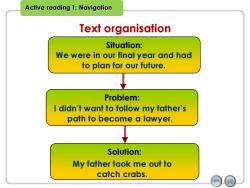
Active reading 1:NavigationText organisationSituation:We were in our final year and hadtoplan for ourfuture.Problem:I didn'twantto follow myfather'spathtobecomealawyer.Solution:Myfathertookmeouttocatchcrabs
Text organisation Active reading 1: Navigation Problem: Solution: Situation: I didn’t want to follow my father’s path to become a lawyer. We were in our final year and had to plan for our future. My father took me out to catch crabs
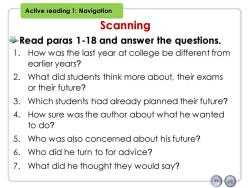
Active reading 1:NavigationScanningRead paras 1-18 and answer the questions.1. How was the last year at college be different fromearlieryears?2.What did students think more about, their examsOr their future?3.Which students had already planned their future?4.How sure was the author about what he wantedto do?5.Who was also concerned about his future?6.Who did he turn to for advice?7.What did he thought they would say?
Scanning 1. How was the last year at college be different from earlier years? 2. What did students think more about, their exams or their future? 3. Which students had already planned their future? 4. How sure was the author about what he wanted to do? 5. Who was also concerned about his future? 6. Who did he turn to for advice? 7. What did he thought they would say? Read paras 1-18 and answer the questions. Active reading 1: Navigation
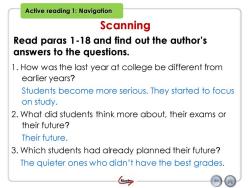
Activereading1:NavigationScanningRead paras 1-18 and find out the author'sanswers to the questions1. How was the last year at college be different fromearlier years?Students become more serious. They started to focuson study.2. What did students think more about, their exams ortheir future?Their future.3. Which students had already planned their future?The quieter ones who didn't have the best grades(More)
Scanning 1. How was the last year at college be different from earlier years? Students become more serious. They started to focus on study. 2. What did students think more about, their exams or their future? Their future. 3. Which students had already planned their future? The quieter ones who didn’t have the best grades. Read paras 1-18 and find out the author’s answers to the questions. Active reading 1: Navigation More
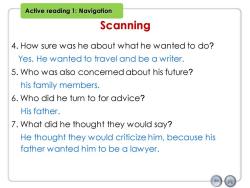
Active reading 1:NavigationScanning4. How sure was he about what he wanted to do?Yes, He wanted to travel and be a writer.5. Who was also concerned about his future?his family members6. Who did he turn to for advice?His father.7. What did he thought they would say?He thought they would criticize him, because hisfather wanted him to be a lawyer
Scanning 4. How sure was he about what he wanted to do? Yes. He wanted to travel and be a writer. 5. Who was also concerned about his future? his family members. 6. Who did he turn to for advice? His father. 7. What did he thought they would say? He thought they would criticize him, because his father wanted him to be a lawyer. Active reading 1: Navigation
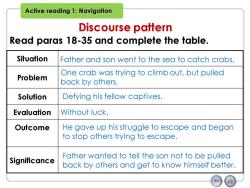
Active reading 1:NavigationDiscoursepatternRead paras18-35 and completethetable.SituationFather and son went to the sea to catch crabs.One crab was trying to climb out, but pulledProblemback by others.SolutionDefying hisfellow captivesWithoutluck.EvaluationHe gave up his struggle to escape and beganOutcometo stop others trying to escape.Father wanted to tell the son not to be pulledSignificancebackbyothersandgettoknowhimselfbetter
Discourse pattern Active reading 1: Navigation Situation Problem Solution Evaluation Outcome Significance One crab was trying to climb out, but pulled back by others. Defying his fellow captives. Without luck. He gave up his struggle to escape and began to stop others trying to escape. Father wanted to tell the son not to be pulled back by others and get to know himself better. Father and son went to the sea to catch crabs. Read paras 18-35 and complete the table
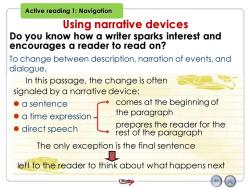
Active reading 1:NavigationUsing narrativedevicesDo you know how a writer sparks interest andencourages a reader to read on?Tochangebetween description,narrationofevents,anddialogue.Inthispassage,thechangeis oftensignaledbyanarrativedevice:comes at the beginning ofa sentencetheparagrapha time expressionprepares the reader for thedirectspeechrestoftheparagraphTheonlyexceptionisthefinal sentenceleft to the reader to think about what happens next(More
Using narrative devices More Active reading 1: Navigation To change between description, narration of events, and dialogue. Do you know how a writer sparks interest and encourages a reader to read on? In this passage, the change is often signaled by a narrative device: ⚫ a sentence ⚫ a time expression ⚫ direct speech prepares the reader for the rest of the paragraph The only exception is the final sentence left to the reader to think about what happens next comes at the beginning of the paragraph
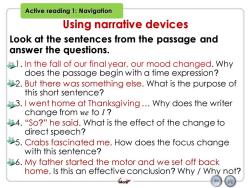
Activereading1:NavigationUsing narrative devicesLook at the sentences from the passage andanswer the questions.dll . In the fall of our final year, our mood changed. Whydoes thepassage begin with a time expression?dla2. But there was something else. What is the purpose ofthis short sentence?dla3. I went home at Thanksgiving ... Why does the writerchange from we to I ?ellk4. "So?" he said. What is the effect of the change todirect speech?d5. Crabs fascinated me. How does the focus changewith this sentence?dllk6. My father started the motor and we set off backhome. Is this an effective conclusion? Why / Why not?More
Using narrative devices More Look at the sentences from the passage and answer the questions. 1. In the fall of our final year, our mood changed. Why does the passage begin with a time expression? 2. But there was something else. What is the purpose of this short sentence? 3. I went home at Thanksgiving . Why does the writer change from we to I ? 4. “So?” he said. What is the effect of the change to direct speech? 5. Crabs fascinated me. How does the focus change with this sentence? 6. My father started the motor and we set off back home. Is this an effective conclusion? Why / Why not? Active reading 1: Navigation
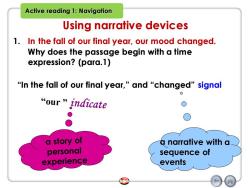
Active reading 1:NavigationUsing narrative devicesIn the fall of our final year, our mood changed.Why does the passage begin with a timeexpression? (para.1)"ln the fall of ourfinalyear,"and“changed"signal8"our"indicateastory ofa narrative withapersonalsequence ofexperienceevents
1. In the fall of our final year, our mood changed. Why does the passage begin with a time expression? (para.1) Using narrative devices “In the fall of our final year,” and “changed” signal Active reading 1: Navigation Back
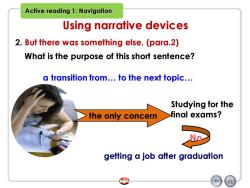
Active reading1:NavigationUsing narrative devices2.Buttherewas something else.(para.2)What is the purpose of this short sentence?a transition from... to the next topic...Studying for thefinal exams?the only concernNogetting ajob aftergraduation
2. But there was something else. (para.2) What is the purpose of this short sentence? Using narrative devices getting a job after graduation Studying for the final exams? the only concern No a transition from. to the next topic. Active reading 1: Navigation Back
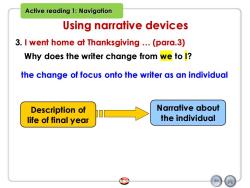
Active reading 1:NavigationUsing narrative devices3.Iwent homeatThanksgiving...(para.3)Why does the writer change from wetoI?the change of focus onto the writer as an individualNarrative aboutDescription oftheindividuallifeoffinalyear
3. I went home at Thanksgiving . (para.3) Why does the writer change from we to I? Using narrative devices the change of focus onto the writer as an individual Description of life of final year Narrative about the individual Active reading 1: Navigation Back
按次数下载不扣除下载券;
注册用户24小时内重复下载只扣除一次;
顺序:VIP每日次数-->可用次数-->下载券;
- 《大学英语读写》课程教学资源(A)Ⅱ_大学英语读写(A)Ⅱ_Book3.Unit3A.exercises.ppt
- 《大学英语读写》课程教学资源(A)Ⅱ_大学英语读写(A)Ⅱ_Book3.Unit3.language in use.ppt
- 《大学英语读写》课程教学资源(A)Ⅱ_大学英语读写(A)Ⅱ_Book3.Unit5A.exercise.ppt
- 《大学英语读写》课程教学资源(A)Ⅱ_大学英语读写(A)Ⅱ_Book3.Unit5.language in use.ppt
- 《大学英语读写》课程教学资源(A)Ⅱ_大学英语读写(A)Ⅱ_Book3.Unit6B.exercises.ppt
- 《基础日语》课程教学课件(PPT讲稿)第16課 春節.ppt
- 《基础日语》课程教学课件(PPT讲稿)第17課 コンサート.ppt
- 《基础日语》课程教学课件(PPT讲稿)第18課 病気 ユニット1 診察.ppt
- 《基础日语》课程教学课件(PPT讲稿)第18課 病気 ユニット2 お見舞い.ppt
- 《基础日语》课程教学课件(PPT讲稿)第18課 病気 ユニット3 読解文 高橋さんの日記.ppt
- 《基础日语》课程教学课件(PPT讲稿)第19課 黄砂 ユニット1.pdf
- 《基础日语》课程教学课件(PPT讲稿)第19課 黄砂 ユニット2 家族からの電話.pdf
- 《基础日语》课程教学课件(PPT讲稿)第19課 黄砂 ユニット3 読解文.pdf
- 《综合英语》课程教学资源Ⅲ_45669_课程资源_Translation exercises_Answers.doc
- 《综合英语》课程教学资源Ⅲ_45669_课程资源_词汇及释义_Unit 1.ppt
- 《综合英语》课程教学资源Ⅲ_45669_课程资源_词汇及释义_Unit 3.ppt
- 《综合英语》课程教学资源Ⅲ_45669_课程资源_词汇及释义_Unit 4.ppt
- 《综合英语》课程教学资源Ⅲ_45669_课程资源_词汇及释义_Unit 5.ppt
- 《综合英语》课程教学资源Ⅲ_45669_课程资源_词汇及释义_Unit 8.ppt
- 《综合英语》课程教学资源Ⅲ_45669_课程资源_词汇及释义_Unit 11.ppt
- 《大学英语读写》课程教学资源(A)Ⅱ_大学英语读写(A)Ⅱ_Book3.Unit1A.exercises.ppt
- 《大学英语读写》课程教学资源(A)Ⅱ_大学英语读写(A)Ⅱ_Book3.Unit1A.Text.ppt
- 《大学英语读写》课程教学资源(A)Ⅱ_大学英语读写(A)Ⅱ_Book3.Unit1A.words to note.ppt
- 《大学英语读写》课程教学资源(A)Ⅱ_大学英语读写(A)Ⅱ_Book3.Unit6B.text organization1..ppt
- 《大学英语读写》课程教学资源(A)Ⅱ_大学英语读写(A)Ⅱ_Book3.Unit6B.words to note.ppt
- 《大学英语读写》课程教学资源(A)Ⅱ_大学英语读写(A)Ⅱ_Writing:English Paragraph Development.ppt
- 《大学英语读写》课程教学资源(A)Ⅱ_大学英语读写(A)Ⅱ_Book3.Unit5A.text organization.pdf
- 《大学英语读写》课程教学资源(A)Ⅱ_大学英语读写(A)Ⅱ_Book3.Unit3.English paragraph writing.ppt
- 《大学英语读写》课程教学资源(A)Ⅱ_大学英语读写(A)Ⅱ_Book3.Unit3A.language points.ppt
- 《大学英语读写》课程教学资源(A)Ⅱ_大学英语读写(A)Ⅱ_Book3.Unit3A.text organization.ppt
- 《大学英语读写》课程教学资源(A)Ⅱ_大学英语读写(A)Ⅱ_Book3.Unit1.Writing1.ppt
- 《大学英语读写》课程教学资源(A)Ⅱ_大学英语读写(A)Ⅱ_Book3.Unit1A.language points.ppt
- 《大学英语读写》课程教学资源(A)Ⅱ_大学英语读写(A)Ⅱ_Book3.Unit8A.课文原文.ppt
- 《学科英语》课程教学资源(文献资料)预习阅读材料10.doc
- 《学科英语》课程教学资源(文献资料)预习阅读材料9.doc
- 《学科英语》课程教学资源(文献资料)预习阅读材料8.doc
- 《学科英语》课程教学资源(文献资料)预习阅读材料7.doc
- 《学科英语》课程教学资源(文献资料)预习阅读材料6.doc
- 《学科英语》课程教学资源(文献资料)预习阅读材料5.doc
- 《学科英语》课程教学资源(文献资料)预习阅读材料4.doc
